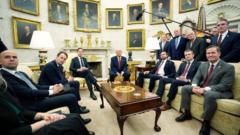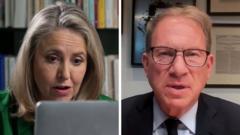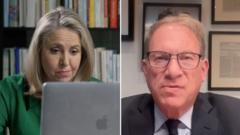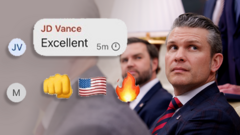A recently leaked Signal group chat between top Trump officials raised alarms over security protocol, revealing internal tensions over military strategy in Yemen. Notable figures, including VP JD Vance and Defense Secretary Pete Hegseth, debated the implications of targeting Houthi forces, reflecting broader concerns about European defense responsibilities.
Revelations from Insider Chat: Security Breach Exposes Trump Administration's Military Plans

Revelations from Insider Chat: Security Breach Exposes Trump Administration's Military Plans
A leaked chat involving high-ranking officials reveals discussions on military actions against Houthi forces in Yemen, highlighting security vulnerabilities and mixed views within the Trump administration.
Washington DC is reeling from a significant security breach linked to the Trump administration, sparked by an article from Atlantic journalist Jeffrey Goldberg. He was unintentionally added to a Signal messaging group composed of influential officials such as Vice-President JD Vance, Defence Secretary Pete Hegseth, and National Security Adviser Mike Waltz. The focus of their discussions centered around a military operation targeting the Iran-backed Houthi group in Yemen, with Goldberg claiming he had access to sensitive military information, including plans, target listings, and timelines concerning the strikes—just two hours prior to their execution.
The revelations from the leaked chat present key insights into the internal dynamics of the administration regarding military action. In the discussion, Vice-President Vance expressed reservations, remarking, "I think we are making a mistake," suggesting that military efforts would predominantly benefit European interests rather than aligning with U.S. priorities. He cautioned against the potential for spiking oil prices due to the strikes and indicated a preference for postponing military action.
In a later communication, a spokesperson for Vance clarified that the Vice-President and President Trump reached a consensus after additional conversations. This included Trump's ongoing critique of European NATO allies for their defense spending, framing it around the narrative of "free-loading" on the part of Europe. The chat also contained heated exchanges, with Vance indicating his discontent over the U.S. supporting Europe again, a sentiment echoed by Hegseth.
Members within the chat displayed a mix of casual expression and seriousness post-strike, responding with emojis reflecting their emotional responses, a critical commentary on the nature of such discussions amidst military operations. The dialogue even addressed messaging strategies, with officials contemplating how to frame their actions publicly, especially in light of perceptions linking Biden to adverse outcomes with Iran.
Goldberg's unanticipated invitation to the chat not only placed the national security framework under scrutiny but ignited calls for an urgent investigation, particularly towards Mike Waltz, who initiated the chat. While Trump claimed ignorance of the whole affair, he did affirm his backing for Waltz, further complicating the narrative around accountability.
As the dust settles on this incident, the implications for U.S. foreign policy and internal governance remain pivotal, spotlighting the intricate balance between transparency and security in governmental communications.





















